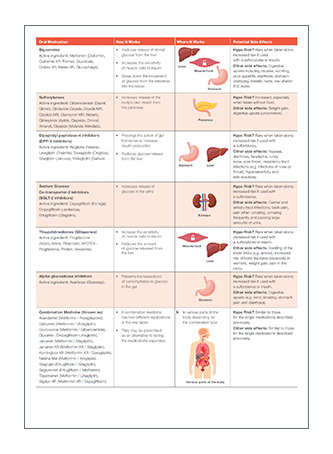Back to Diabetes SA resources
Management of diabetes usually involves a combination of healthy eating, regular exercise and medication.
 Download the Diabetes and Medication resource and learn about different classes of medication for diabetes, how they work and what the potential side effects are.
Download the Diabetes and Medication resource and learn about different classes of medication for diabetes, how they work and what the potential side effects are.
Download the Diabetes and Medication – A guide to assist you in managing diabetes resource that explains the different types of oral and injectable medications, how they work, possible side effects and some key points to consider.
Medications prescribed for diabetes come in several different forms
- Oral medication, which is taken by mouth and swallowed.
- Injectable medication, which is injected into the fatty (subcutaneous) layer just under the skin surface.
Different classes of medication for diabetes
Whilst all diabetes medications assist with the
management of blood glucose levels, they don’t
all work in the same way. Medications are grouped
into different classes depending on how they work
within the body. Medications within these classes
all have their own ‘active name’ which identifies the
chemical in the medication that works within the
body. The medications also have a ‘brand name’
or ‘trade name’ which is the name given to the
medication by its manufacturer.
Often with type 2 diabetes, a single
medication may be effective in managing blood
glucose levels initially. Over time, however, as
the condition progresses, or an individual’s
circumstances change, additional medication may
be added to existing medication to adequately
manage blood glucose levels. It is important to note
that the injectable medication, insulin is used in the
treatment of type 1 and type 2 diabetes.
Know your medications
It is important to know the following about your medication:
- Name of the medication you are taking
- How long before an effect is seen after
commencing or changing the dose of your
medication — (i.e. when would I expect to see
changes in my blood glucose levels)?
- How many times a day should I take the
medication, and should I take the dose before,
after or with food?
- What should I do if I miss a dose?
- How will the medication affect my driving,
alertness or my ability to operate machinery?
- Will my medication increase my risk
of hypoglycaemia (hypo)?
- What do I need to do in relation to my medication
if I am ill, fasting or having a surgical procedure?
- Is this medication suitable during pregnancy
and breastfeeding?
Other considerations
- Do not use other people’s medications
or share your own with anyone else.
- Review all the medications you are taking
with your doctor and pharmacist to verify
their effectiveness.
- Carry a list of current medications with
you at all times.
- Store your medications correctly in accordance
with the manufacturers’ recommendation, check
the expiry date prior to consumption and do not
take out of date medications.
Download
Download: Diabetes and Medications
Diabetes and Medication – A guide to assist you in managing diabetes
 Download: Diabetes and Medications – A guide to assist you in managing diabetes
Download: Diabetes and Medications – A guide to assist you in managing diabetes
NEW! This resource has been developed to provide more information about the different oral and injectable medication, how it works and potential side effects.
This resource provides additional information about where each of the medications work – such as in liver, stomach, pancreas, kidneys, 'muscle/lock' or 'muscle; key & lock', helping people understand how different types of diabetes medication work.